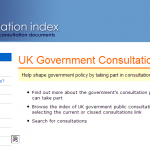Tom Watson, soon-to-be former Member of Parliament for West Bromwich East, has been the greatest advocate for, and representative of the ‘digital industry’ in the past few years: not just in his time as Cabinet Office minister, but just as much (and arguably moreso) in the period afterwards. I’ve no idea if he has been a good representative of the good people of West Bromwich; but I do know that he raised more issues of direct relevance to me, my work and my areas of interest than the MP who notionally represents me, solely on the basis of where I live.
So I’m intrigued by Tom’s move today, to ask the online community to help him draft a one-man manifesto on technology. He explains:
I want to stand on a platform that is avowedly supportive of the generation that seek to use the Internet to make the world a better place. To do this I have to be able to draw authority from an electoral mandate from electors in West Bromwich East. So I’d like to produce a leaflet that sets out what I stand for. It will be delivered to as many homes in West Bromwich as my campaign team can manage.
There’s a fascinating subtext to that plea: Tom clearly sees the representation of the digital community as one of his key purposes in public life, but he needs the electorate of a geographically-defined area to back him first. The message to the constituency is effectively that the country needs him, and they need to do their duty, whether or not they really understand why.
This is an idea I’ve been quietly contemplating for some time: the notion that a political system based on geographic location is increasingly anachronistic. The World Wide Web has reduced, if not eliminated the need to define oneself on the basis of place. If you’re supposed to judge me by the company I keep, that company exists – for the most part – ‘in the cloud’, not in the immediate vicinity of my house.
Which brings me to the concept of ‘functional constituencies’ – a term I came across in relation to Hong Kong, when working at the Foreign Office in the mid-1990s. Half of Hong Kong’s 60-seat Legislative Council is elected on the basis of geographical constituencies; the other half is elected by ‘functional constituencies’, defined by people’s professions or interests. So for example, there’s a ‘representative for accountancy’, voted in by 22,000-odd individuals registered as working in accountancy; and there’s a ‘representative for Information Technology’, voted by a combination of 364 institutions and 5,000-odd individuals. Wikipedia has the full breakdown.
There’s a not dissimilar situation much closer to home, in Ireland. The Irish Senate (or Seanad) consists of 60 people, 43 of whom were chosen by five panels representing – very broadly defined – vocational interests, and a further 6 by the graduates of two particular universities. (See Wikipedia for details.)
Neither system is perfect, with democracy campaigners seeking changes to, if not the complete abolition of the arrangements. And I’m claiming no expertise whatsoever in the design of democratic systems. But there’s certainly something appealing about a system that recognises – or can be made to recognise – that the nature of community and representation is evolving.
When the manifestos are published this week, we’re almost certain to see all three main UK parties offering proposals for an elected (or ‘mainly elected’) House of Lords. But a second chamber consisting of more members of the same old political class, no matter how proportionally elected, is not particularly enticing. I actually quite like the idea that the House of Lords includes appointees who have demonstrated excellence in their professional field; but I can appreciate that any system based on party nominations doesn’t exactly pass the democratic test.
So why not a system where professionals democratically select those from their own ranks, who best represent their community’s expertise, experience, knowledge and concerns? On the face of it, it has the potential to take representative democracy in a whole new direction, and make it more immediately relevant to all parts of society. Defining the right ‘functional constituencies’, and the eligibility criteria to become an elector for each, would be a hell of a job. But it couldn’t fail to end the notion of ‘them and us’.
Hey, we could even call them ‘peers’. 🙂

